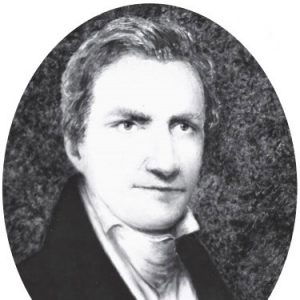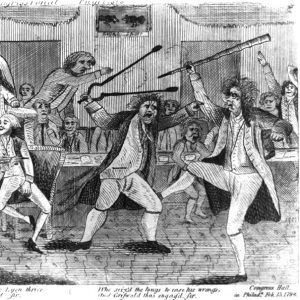calsfoundation@cals.org
Matthew Lyon (1749–1822)
Matthew Lyon, a six-term congressman who represented first Vermont and later Kentucky, was an iconic figure in the early American republic. Always outspoken, he frequently found himself at the center of the early battles between the Federalist Party and his own Jeffersonian Republicans (a.k.a. the Democrat-Republican Party or Republican Party). After a tumultuous multifaceted career in Congress, Lyon spent his final years in Arkansas, where he had moved in 1820 after his appointment as U.S. factor to the Cherokee Nation in the Arkansas Territory.
Matthew Lyon was born on July 14, 1749, in Ireland, not far from Dublin. His father, a political protestor, was killed when Lyon was a young boy. He received his early education in Dublin, where he began to learn the printing trade. When his mother refused to allow him to go to the American colonies, he made his own arrangements, arriving in 1765 and originally working as an indentured servant in Connecticut. He moved to present-day Vermont in 1774, and with tensions between the colonies and Great Britain increasing, Lyon organized a militia company. He would later serve as a lieutenant with Green Mountain Boys, and he was part of the force that captured Fort Ticonderoga. However, a rebellion of troops under his command led to his discharge from army, and he formally resigned in 1778. That same year, he won election to the Vermont House of Representatives, where he would represent the town of Arlington from 1779 to 1783. In 1783, he founded the town of Fair Haven, representing that town in the Vermont legislature from 1783 to 1796.
Lyon married Mary Hosford in 1772, and they had four children. After Mary died in 1782, Lyon married Beulah M. Chittenden in 1784; they had eight children.
Lyon built and ran a number of different mills, including a paper mill that he put to good use in 1793 when he opened a printing office and began the publication of the Farmers’ Library. Later, he published the Fair Haven Gazette, a newspaper dedicated to supporting the Republican Party of Thomas Jefferson and James Madison.
In 1796, after three unsuccessful attempts, Lyon finally won election to the U.S. House of Representatives. There, he became a lightning rod in the increasingly acrimonious, ideologically based battles between the Republican Party and the opposition Federalists. In 1798, Lyon and Congressmen Roger Griswold of Connecticut engaged in an iconic battle on the floor of the House. While reports vary, Lyon allegedly spit in Griswold’s face following venomous insults by the Connecticut congressman. In response, the Federalists mounted an unsuccessful effort to expel Lyon from House, and Griswold attacked Lyon with his cane in the House chamber. Lyon defended himself with fireplace tongs. The episode led the Federalists to dub Lyon the “Beast of Vermont,” and following the passage of the Sedition Act in 1798, Lyon was targeted for his criticisms of President John Adams. Convicted, he was fined $1,000 and sentenced to four months in jail. Reveling in his role as martyr for the cause of liberty, Lyon won reelection in 1798 despite still being in jail. The Federalists again sought his ouster from the House, while a local prosecutor sought his arrest on new charges of seditious libel.
Ever restless and with his political prospects limited, he left Vermont in 1801 and moved to Kentucky. Lyon quickly established a number of successful businesses before turning his attention back to politics. He first won a seat in the Kentucky House of Representatives, and, in 1802, he won election to the U.S. House of Representatives. He was reelected three more times before being defeated in 1810, his opposition to the approaching War of 1812 not being well received in the state.
After the War of 1812, Lyon suffered some business setbacks and sought a government position. In response, President James Monroe appointed him U.S. factor to the Cherokee Nation in the Arkansas Territory in 1820. Embracing the new position, he settled in Spadra (Johnson County) later that year. Almost immediately, he returned to the political wars, seeking election in 1821 to the Seventeenth Congress as delegate from the Arkansas Territory. Despite being over seventy years old and new to the territory, he was only narrowly defeated by the incumbent James Bates. Though he contested the result, the House Committee on Elections upheld Bates’s win.
Lyon died on August 1, 1822, in Spadra. He was interred in Spadra Bluff Cemetery, but he was re-interred in River View Cemetery in Eddyville, Kentucky, in 1833.
For additional information:
Campbell, Tom W. Two Fighters and Two Fines: Sketches of the Lives of Matthew Lyon and Andrew Jackson. Little Rock: Pioneer Publishing Company, 1941.
Dillard, Tom. Statesmen, Scoundrels, and Eccentrics: A Gallery of Amazing Arkansans. Fayetteville: University of Arkansas Press, 2010.
“The Life of Representative Matthew Lyon of Vermont and Kentucky.” History, Art & Archives, United States House of Representatives.” http://history.house.gov/HistoricalHighlight/Detail/36323?ret=True (accessed November 18, 2020).
“Matthew Lyon.” Biographical Directory of the United States Congress http://bioguide.congress.gov/scripts/biodisplay.pl?index=L000545 (accessed November 18, 2020).
William H. Pruden III
Ravenscroft School


 Matthew Lyon
Matthew Lyon  Political Cartoon of Brawl
Political Cartoon of Brawl 



Comments
No comments on this entry yet.